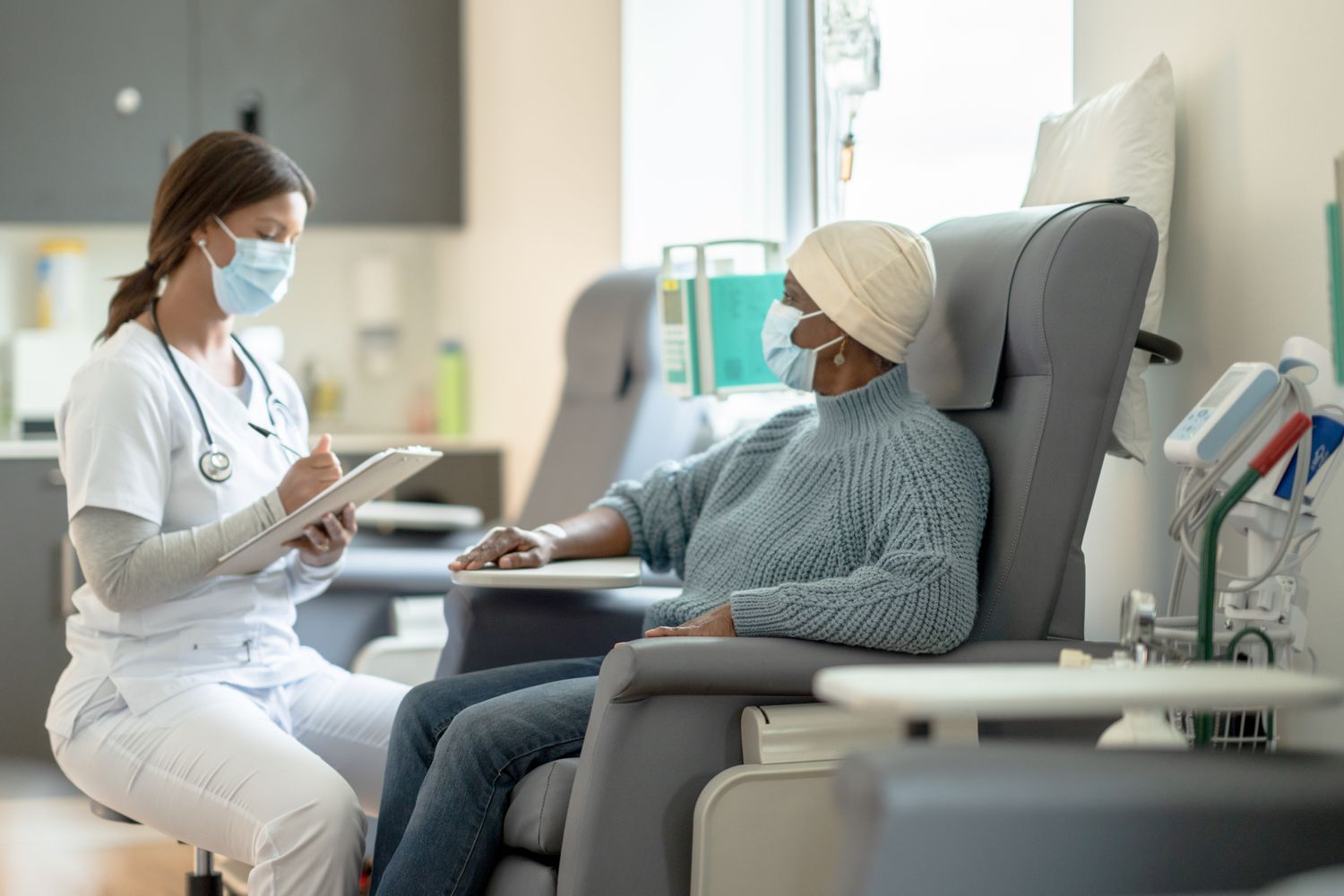
Key facts
- Chemotherapy uses medicines to destroy or slow the growth of cancer cells.
- Chemotherapy can be used by itself to treat cancer, or together with other types of treatment, such as surgery, radiotherapy and immunotherapy.
- Chemotherapy may also damage healthy cells, causing a range of side effects.
- Side effects can often be managed with medicines and other strategies suggested by your medical team.
- The type, dose and length of chemotherapy treatment will depend on the type and stage of cancer, your general health and your treatment goals.
What is chemotherapy?
Chemotherapy is a word used to describe a group of strong medicines often used to treat cancer. Chemotherapy is used to destroy cells that grow quickly — including cancer cells, which are usually fast-growing.
How does chemotherapy work?
Your body is made up of billions of small building blocks called cells. The different tissues and organs of your body are comprised of different types of cells. Your body’s cells reproduce to make new cells. When you are healthy, this process of division is tightly controlled and only takes place when needed, for example, to replace damaged or old cells. If your cells begin to grow and divide in an uncontrolled way, you may develop a cancer.
Chemotherapy is designed to target cells that grow quickly, such as cancer cells. Chemotherapy is known as a ‘cytotoxic’ medication — this means that it is poisonous (‘toxic’) to cells (‘cyto’ means ‘cell’).
Chemotherapy may be used in cancer treatment for a few different reasons:
- Curative chemotherapy is designed to directly treat the cancer and try to destroy it, usually without the use of other treatments.
- Neoadjuvant chemotherapy is used before surgery to remove a cancerous tumour, to try and shrink it to make it easier to remove during surgery.
- Adjuvant chemotherapy is used together with other treatments such as surgery and radiotherapy to increase the chance of successfully destroying the cancer.
- Palliative chemotherapy is not usually meant to cure cancer. It can be used to reduce cancer size, which can improve symptoms caused by a cancerous tumour or to limit the growth and spread of the cancer and prolong life. This kind of chemotherapy may be used for months or years.
How is chemotherapy given?
Chemotherapy can be given in a few different ways, depending on the type of cancer and how far it has spread.
Chemotherapy is often given directly into your blood through a vein (intravenously, or IV). If this is the case, it will often be given at a day hospital or day-treatment centre and you can usually go home between sessions. Sessions may last for anywhere between less than an hour and several hours, depending on the kind of chemotherapy you are getting and how you feel during and after treatment.
If the medicine needs to be given for only a short time (up to a few days), it can be given through a small plastic tube (cannula) inserted into a vein, usually in your hand or arm. It is placed with the help of a small needle in a procedure that is much like how a blood test is performed.
If you need to receive IV treatment for a longer period of time, your doctor or oncologist may discuss adminitstering a ‘port’. This kind of intravenous tube which can stay in place for weeks or months, saving you from getting a new IV line every time you receive chemotherapy.
Chemotherapy can also be given in other ways, for example in the form of tablets or a cream. It can also be injected into a specific body area for certain types of cancer.
What are the side effects of chemotherapy?
Chemotherapy uses strong medicines which often have side effects. Everyone responds differently to chemotherapy; you may experience many or few of these side effects and feel them strongly or only mildly.
Most commonly, people on chemotherapy feel tired and fatigued. As chemotherapy affects fast-growing cells, it commonly causes side effects in your skin, hair, gut and immune system, since the cells in these areas are particularly fast-growing.
These side effects can include:
- hair loss
- nausea and/or vomiting
- diarrhoea or constipation
- mouth sores
- frequent infections
Some chemotherapy medicines can have a higher chance of damaging specific areas of your body, such as your heart, lungs, bladder or nervous system. These effects may last temporarily or permanently. Ask your doctor about the medicines recommended for you and any specific effects that they may have on your body.
There are many medicines and strategies which can help ease any side effects that you may experience. For example, your doctor can prescribe medicines to help with nausea. Ice chips can help sooth a sore mouth, and there are even treatments such as ‘cold caps,’ which can help reduce hair loss. Your medical team can give you more detailed suggestions and advice about what is available to help you remain as comfortable as possible during your treatment.
How long will I need chemotherapy?
The specific type, dose and length of your chemotherapy will depend on many factors, including the type and stage of your cancer, your general health, the purpose of the chemotherapy and how well your cancer is responding to treatment.
Chemotherapy is usually given in ‘cycles’. For example, a patient may receive 2 weeks of treatment then have a 2-week break, before this cycle continues. This gives your body a chance to recover and you and your medical team a chance to see how well your cancer responds to the treatment. You may need blood tests or scans between treatment cycles to check on the cancer, and to make sure your body has recovered enough to cope with the next dose of chemotherapy. Your medical team may make changes to your treatment based on how you feel and on your test results.
Will chemotherapy affect my fertility?
In both men and women, chemotherapy can affect your fertility by damaging the cells of your reproductive organs, such as eggs or sperm. Sometimes these cells will recover months or years after chemotherapy, but sometimes the damage is permanent.
In women, chemotherapy may also affect your menstrual cycle, causing it to become irregular or stop completely while you are receiving treatment. In some cases, your cycle will return after you stop chemotherapy, but in other cases it will stop permanently, causing early menopause, and making it impossible to conceive naturally.
Some people choose to take steps to preserve their fertility before starting cancer treatment. These steps can include freezing eggs, sperm or embryos, or involve more complex treatments.
Your options will depend on the cancer you have and on the treatment suggested by your doctor. You may wish to discuss fertility preservation with your medical team before you start any cancer treatments.
Despite this, it is important to realise that you may still be fertile while undergoing cancer treatment. Chemotherapy is considered dangerous for an unborn baby, who has many fast-growing cells, so you may also wish to discuss contraception with your doctor before starting treatment.



